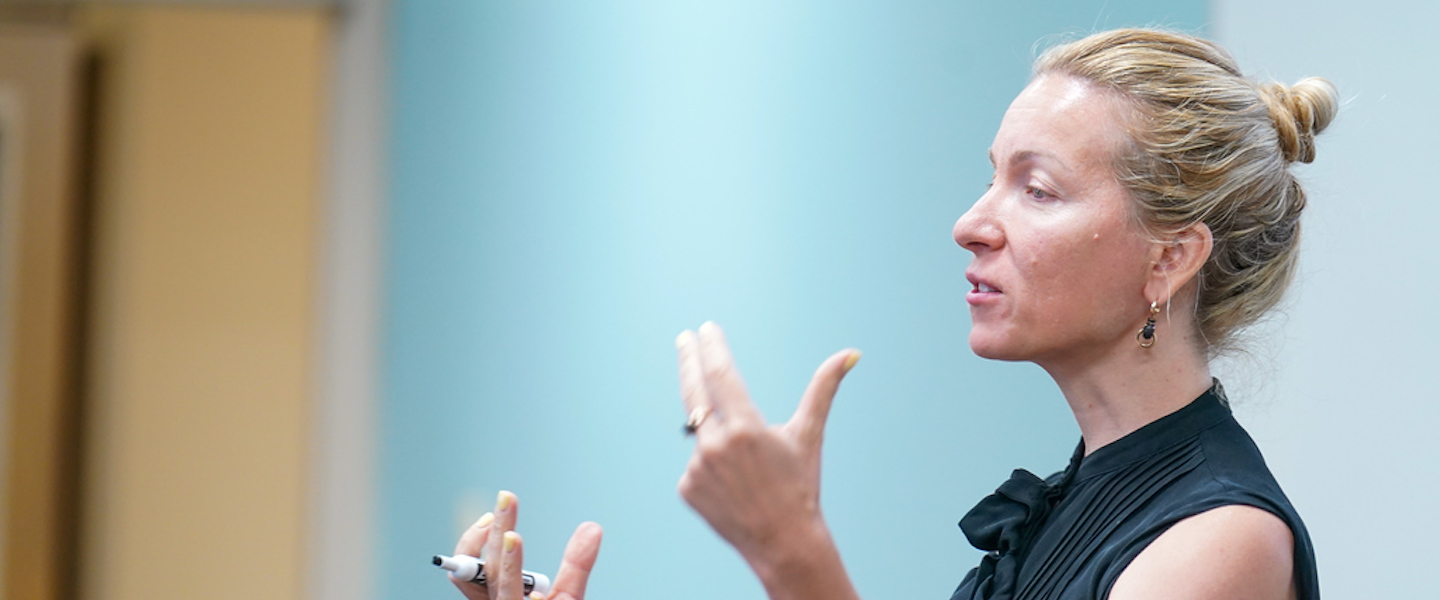Why Major in Economics?
Do you consider yourself detail-oriented and analytical? Do you enjoy utilizing critical thinking to understand complex systems? Belmont’s economics programs will encourage your curiosity and help strengthen your quantitative, oral and written communication skills. While at Belmont, you will interact with economics faculty who possess an array of industry experience, secure internships in a plethora of industries, and be charged to explore your purpose so that you may solve the most pressing economic and social concerns.
You have options when studying economics at Belmont. You may want to pursue the Bachelor of Business Administration (B.B.A.) degree path where you will receive a broad business education. The Bachelor of Science (B.S.) degree option is more liberal arts in nature and incorporates a minor in business or another area of interest and serves those interested in business, politics or policy on a global scale.
Graduates of the economics program have advanced to working in consulting firms, governmental agencies, the private sector and education. Nashville’s thriving business community is outside Belmont’s front doors, and our faculty and staff will work with you to ensure you are positioned for success. However you plan to use your Belmont economics degree, we are confident you will create a life of fulfillment and purpose.
Our focus on experiential learning provides a solid foundation for what is to come in the professional world. Undergraduate students are encouraged to get involved with our student-run ventures, business hatcheries, Financial Information Center, internships and student organizations to apply learning and gain experience outside of the classroom.
In addition to providing an excellent foundation for graduate school, a background in economics is very beneficial for business and community leadership roles. Opportunities for economists exist in private industry, consulting firms, governmental agencies and education. Notably, the demand for workers who have knowledge of economics is projected to grow faster than the average for all occupations.
What You'll Learn
- Basic operation of a market economy
- Banking system, fiscal, monetary and supply-side economic policies
- Behavior of individual decision-making units
- Demand and supply analysis
- Market structures and resource allocation
Program Details
Curriculum
The economics major leads to the Bachelor of Business Administration (B.B.A.) and requires a total of 128 credit hours of coursework:
- BELL core requirements: 50 hours
- Business courses: 35 hours
- B.B.A. core technical requirement: 3 hours
- Major area: 18 hours
- Major electives: 12 hours
- General electives: 22 hours
Courses You'll Take
ECO 2210 Principles of MacroeconomicsAn introductory course in macroeconomic theory. Primary emphasis is placed upon the study of economic aggregates. Topics to be studied include: the basic operation of a market economy; national income accounting, the determination of employment, output and the price level; the banking system, fiscal, monetary and supply-side economic policies.
ECO 2220 Principles of Microeconomics
An introductory course in microeconomic theory. Primary emphasis is placed upon the study of the behavior of individual decision-making units. Topics to be studied include: demand and supply analysis, the theory of consumer behavior, the theory of the firm, market structures and resource allocation and resource price-employment determination.
ECO 3000 Labor EconomicsAn extension of economic principles to labor markets. Primary emphasis is placed on household and firm decision-making units within the labor market. Topics to be studied include: labor demand and supply, wage differentials, minimum wage legislation, unemployment, investment in human capital, worker mobility, effects of labor unions, gender, race and ethnicity in the labor market and earnings inequality.
ECO 3260 Intermediate MacroeconomicsAn extension of ECO 2210 designed to provide students with a richer treatment of modern macroeconomic principles and policy. Topics include national income and employment determination, unemployment and inflation, economic growth theory and policy, monetary and fiscal policy and the influence of international trade and trade policy on the U.S. economy.
ECO 3270 Intermediate MicroeconomicsAn extension of ECO 2220, designed to provide students with a firm grasp of modern microeconomic principles and their application. Topics include consumer behavior and demand analysis, production and cost analysis, resource price and employment determination, market structure and performance and the influence of public policy on industry performance.
ECO 3310 Healthcare EconomicsThis course will guide students to understand how economic principles apply to the market for healthcare. Topics of study will include cost-benefit analysis, the market for insurance, the pharmaceutical industry, the private markets for physicians and hospital services and the potential roles for government in healthcare. The course will include a brief survey of alternate healthcare delivery systems and models for reform.
ECO 3800 Comparative Economic SystemsThis course investigates the organization of economic systems in the world’s major industrialized nations. Through comparative analysis of social, private sector and governmental institutions, students learn the strengths and weaknesses of national economies. The economics of China, the European Union, Japan and the Commonwealth of Independent States are the primary areas of interest for this course. Particular emphasis is placed upon the impact of globalization in each economy.
ECO 4200 History of Economic ThoughtA study in the development of economic thought from ancient to modern times with primary emphasis on the Classical, Neo-classical and Keynesian periods.
ECO 4400 International EconomicsAn examination of the special problems and issues surrounding the economic interaction of sovereign nations. Topics include gains from trade, patterns of trade, balance of payments, determination of exchange rates, free trade and protectionism, international capital markets and issues in international policy coordination.
ECO 4500 Global Managerial EconomicsStudies the application of economic principles to managerial decision-making within the context of the global environment. Topics included demand and cost analysis, production principles and analysis, measurement and analysis of profits, pricing principles and practices, supply chain management considerations, trade finance options and the influence of market structure on business decisions for enterprises in the United States and the wider international community.
ECO 4700 Economic Growth and DevelopmentA survey of contemporary economic theories on the determinants of national economic welfare with particular emphasis placed on overcoming the challenges confronting developing countries. Course provides a historical, socio-political, theoretical and institutional context for discussing poverty, wealth, capital accumulation and international aid.
Accelerated MBA 4 +1
The MBA-Accelerated (A.M.B.A.) program is a full-time M.B.A. designed for individuals with little or no full-time business work experience. Individuals admitted to the A.M.B.A. program begin course work in the fall term and complete their studies in the following summer - a total program length of 12 months from start to finish. Through active learning and scholarly exploration, the A.M.B.A. degree is designed to prepare students for entry-level administrative and managerial positions in both the private and public sector. Students will be equipped with comprehensive business skills, analytical tools, and moral clarity to effectively manage diverse teams and lead organizations in today’s rapidly changing and dynamic, global business environment.
The A.M.B.A. is a non-thesis degree consisting of 36 hours, of which 30 hours are required core courses and 6 hours are elective courses that are chosen by the student. M.B.A. elective courses may be related to a specific area (e.g. FIN, ETP, BSA, etc.) or may be independent of each other providing students with a broader point of view.
Whether you want to launch your own startup, consult with Fortune 500 companies or explore investment banking, you'll get an early start on building your career. As an Accelerated MBA student, you’ll enjoy small class sizes and outstanding faculty who bring industry experience to every class they teach. Classes meet four evenings a week on a full-time basis, giving you flexibility during workday hours to complete internships, graduate assistantships or part-time jobs. And you can complete the program in less than a year.
Learn more about Belmont's AMBA
Integrated Degree, M.ACC./B.B.A.
Belmont University’s integrated M.ACC. and B.B.A. degree program is designed to meet today’s needs of those wishing to make accounting a career choice. Today’s accountants must possess much more than just technical accounting knowledge; they must also have a broad understanding of various business activities and possess strong communication, intellectual, and interpersonal skills. In recognition of those additional skills most states, including Tennessee, have passed laws or issued regulations requiring at least 150 hours of higher education to sit for the uniform CPA examination. Also the AICPA requires new members to possess 150 hours of higher education.
Increasingly, businesses are hiring new professionals who have master’s degrees. These include public accounting firms, manufacturing companies, and service providers in healthcare, finance, and insurance, as well as governmental organizations. Belmont’s integrated accountancy degree is a program which meets employer needs and provides graduates with exceptional career opportunities.
The integrated program is only for accounting concentration students in the Undergraduate School of Business Administration at Belmont University and is designed to be completed in a five-year time period.
The Jack C. Massey College of Business offers a variety of co-curricular leadership and learning opportunities to qualifying students in the form of student organizations and honors societies. Each organization has a faculty advisor, if not multiple. Therefore, our students are able to network and collaborate with faculty both in and out of the classroom.
Student Organizations
- Association for Information Systems
- American Marketing Association
- Business Student Advisory Board
- Collegiate DECA
- Enactus
- Equity Trading Club
- International Business Society
- Society for Human Resource Management
- Student Center for the Public Trust
Honor Societies
- Beta Alpha Psi
- Beta Gamma Sigma
- Omicron Delta Epsilon
- Sigma Nu Tau
A Global Perspective
As the workplace becomes more international in scope, a successful manager needs knowledge and skills that extend beyond the traditional business disciplines. Thus, Belmont’s Jack C. Massey College of Business places a strong emphasis on the global business community and requires all BBA degree-seeking students to complete an international business course. Global issues are also interwoven throughout other courses in the business curriculum.
In addition to classroom learning, all students in The Jack C. Massey College of Business are encouraged to participate in Belmont’s Study Abroad program. Business study abroad programs and exchange opportunities are available in numerous countries. Our students travel to six of the seven continents, immersing themselves in the language, culture and business of each country they visit.
Earn credit towards:
- Major
- Minor
- General Education
Program length:
- Academic Year
- Semester
- Summer
- Maymester
Maymester is a two to three week study abroad experience during the month of May where Belmont students take advantage of tuition discounts and can sometimes earn up to nine credit hours. Maymester trips are led by Belmont faculty members, so students are able to further connect with their faculty in a meaningful way.
Immerse yourself in language, culture and business on a global scale by studying abroad.
For additional information on Belmont’s study abroad programs, please visit our Center for Global Citizenship or Office of Study Abroad.
We are an innovative, student-centered learning community that prepares entrepreneurially, ethical and socially responsible future business leaders for the dynamic global economy.
We are committed to:
- Relevant, interactive and experiential academic programs provided by faculty with diverse and extensive academic qualifications and professional experience;
- Advising and mentoring students for career growth and development;
- Impactful scholarship that advances the practice, knowledge and teaching of business and management;
- Engaging the communities we serve through value-added relationships.
Organized in 1916, The Association to Advance Collegiate Schools of Business (AACSB) is the premier agency for bachelor’s, master’s and doctoral degree programs in business administration and accounting. AACSB International accreditation represents the highest standard of achievement for business schools worldwide.
Fewer than 5 percent of the world’s business schools are able to adhere to standards that result in AACSB accreditation of their business education programs. A much smaller group, fewer than 2 percent of business schools (185) worldwide, have earned the separate, specialized accreditation for their accounting program.
Belmont University’s Jack C. Massey College of Business is the only private college or university in Tennessee that is accredited by AACSB International for our B.B.A. and M.B.A. programs, as well as our Accounting major and Master of Accountancy degree.
Career Possibilities
- Budget Analyst
Budget analysts help companies and organizations keep their finances on track. They prepare budgets and develop forecasts based on past spending and economic trends. - Economist
Economists study the ways a society uses scarce resources such as land, labor, raw materials and machinery to produce goods and services. They analyze the costs and benefits of distributing and consuming these goods and services. - Financial Analyst
Financial analysts provide guidance to businesses and individuals making investment decisions. They assess the performance of stocks, bonds and other types of investments. - Market Research Analyst
Market research analysts study market conditions to examine potential sales of a product or service. They help companies understand what products people want, who will buy them and at what price. - Actuary
An actuary is a business professional who analyzes the financial consequences of risk. Actuaries use mathematics, statistics and financial theory to study uncertain future events, especially those of concern to insurance and pension programs. - Healthcare Economist
- International Economic Development
- Decision Scientist
- Public Relations Strategist
- Business Intelligence Analyst
- Infrastructure Economist
- Global Policy and Research Associate
- Legislative Director
- Economic Consultant
- And more...
Request Information
Contact Us
Jack C. Massey College of Business
Justin Tatooles
Admissions Coordinator
615.460.5188
Email Justin




